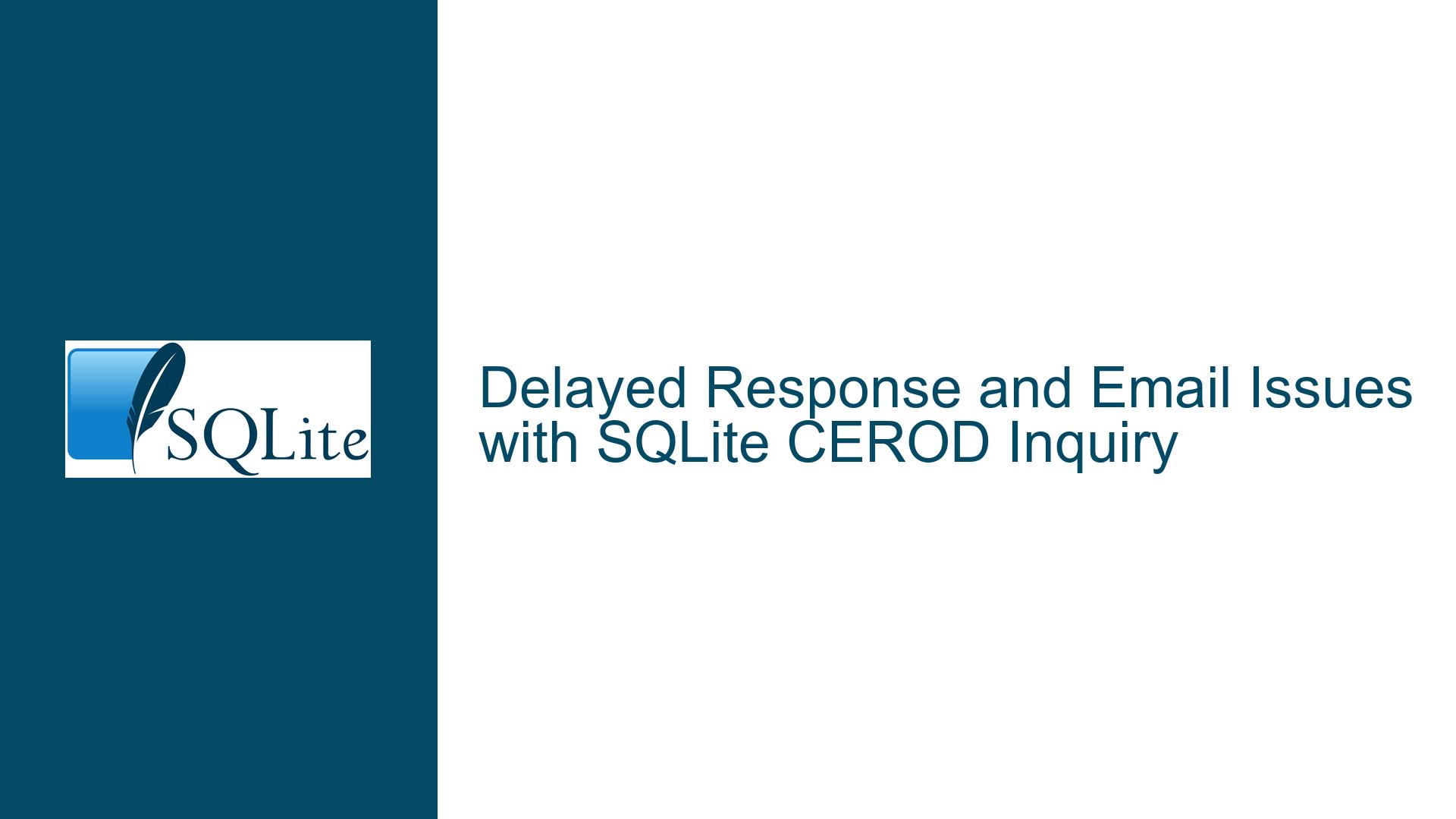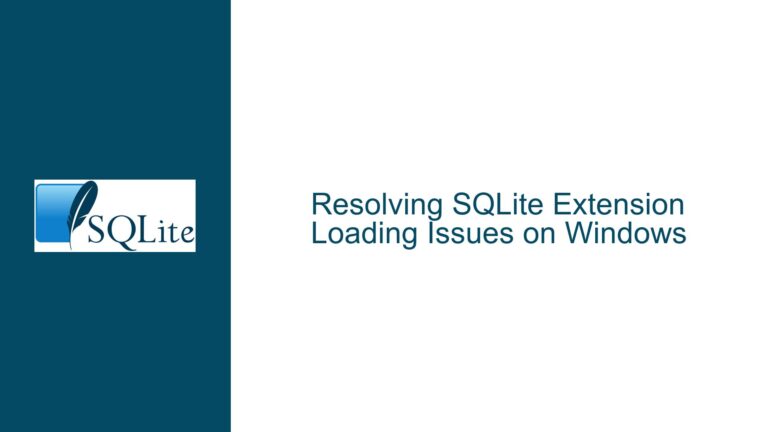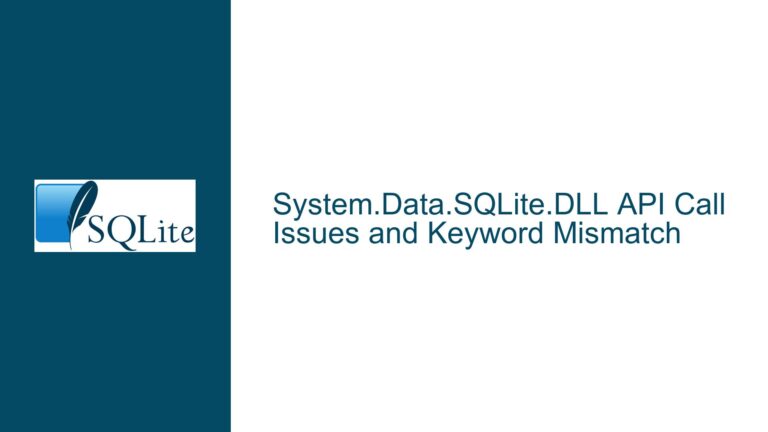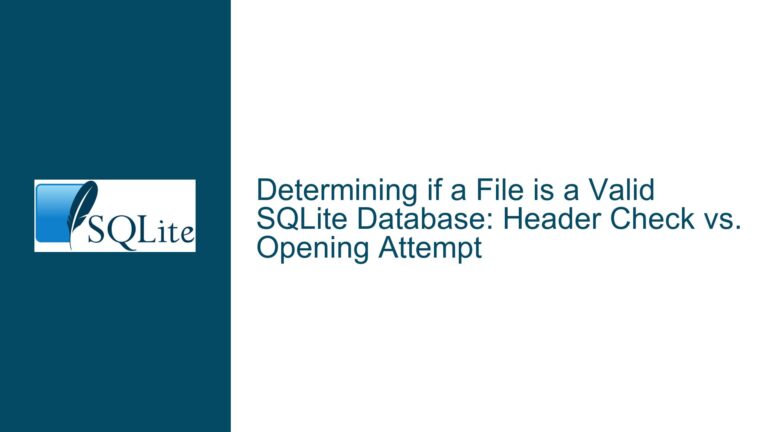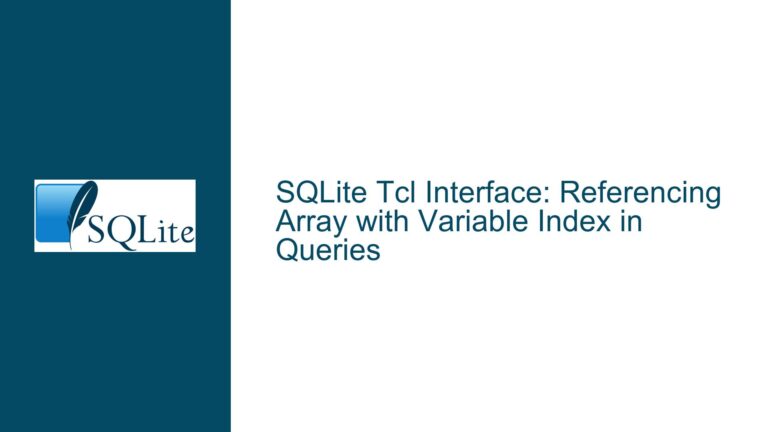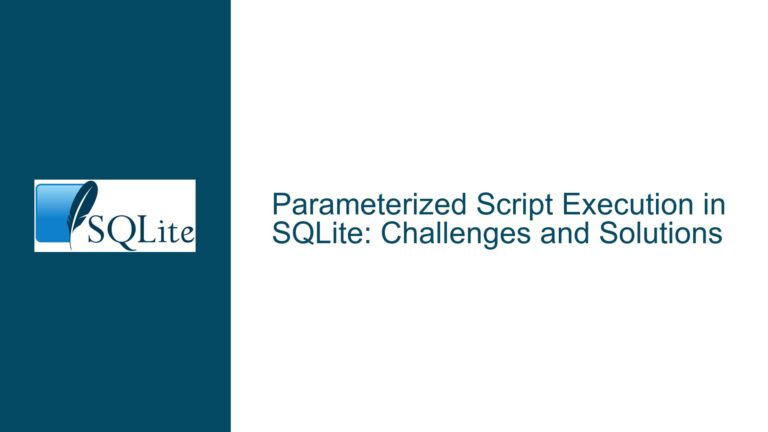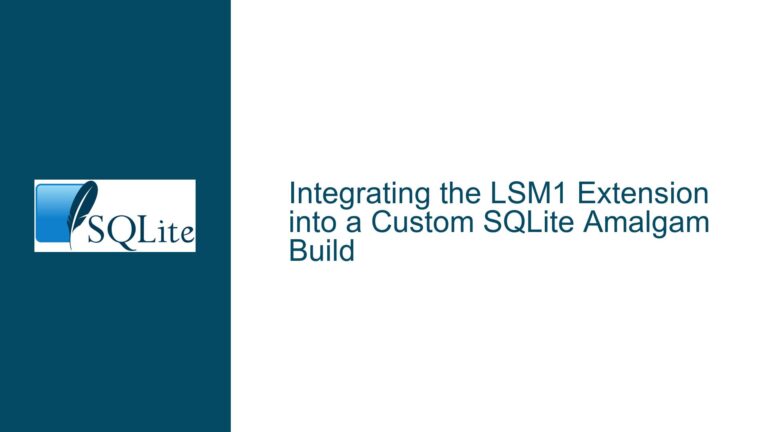Delayed Response and Email Issues with SQLite CEROD Inquiry
Issue Overview: Delayed Response and Email Delivery Problems
When attempting to contact the SQLite team regarding the CEROD (Compressed and Encrypted Read-Only Database) extension, users may encounter delays in receiving responses or find that emails are not delivered as expected. This issue can be particularly frustrating when the inquiry is time-sensitive or when the user is eager to evaluate the CEROD extension for their specific use case. The CEROD extension is a specialized tool designed to compress SQLite databases, making it ideal for scenarios where storage space is limited, such as on mobile devices or legacy media like CDROMs/DVDs. However, the process of obtaining information, trial licenses, or support for CEROD can be hindered by email delivery issues, spam filters, or miscommunication.
The core of the problem lies in the communication channel between the user and the SQLite team. Email, while a common and convenient method of communication, is not immune to technical issues. Emails can be flagged as spam, lost in transit, or overlooked due to high volumes of incoming messages. In the case of the CEROD extension, the user’s initial email to [email protected] went unanswered for more than two days, prompting a follow-up message. Richard Hipp, the primary developer of SQLite, responded promptly, but the user did not receive the email, leading to further confusion and delays. This highlights the importance of ensuring that emails are correctly delivered and that users are aware of potential issues with their email providers or spam filters.
The CEROD extension itself is a powerful tool for optimizing SQLite databases in read-only environments. It uses zLib compression to reduce the size of the database, which can be particularly beneficial for mobile applications where storage space is at a premium. However, the performance implications of using CEROD must be carefully considered. While the extension can reduce I/O operations by compressing data, the decompression process can introduce additional overhead, especially on modern devices with fast storage. Understanding these trade-offs is crucial for making an informed decision about whether CEROD is suitable for a given use case.
Possible Causes: Email Delivery Failures and Spam Filtering
The primary cause of the delayed response and email delivery issues in this scenario is likely related to spam filtering or email routing problems. Modern email systems employ sophisticated spam filters to protect users from unwanted or malicious messages. While these filters are generally effective, they can sometimes incorrectly flag legitimate emails as spam, causing them to be routed to the spam folder or blocked entirely. In this case, Richard Hipp’s response to the user’s inquiry was not received, even after the user checked multiple folders, including Spam, Social, Updates, Forums, Promotion, and All Mail. This suggests that the email may have been blocked by the user’s email provider or misrouted due to a configuration issue.
Another possible cause is the use of a shared or generic email address, such as [email protected], for inquiries. While this approach centralizes communication and ensures that messages reach the appropriate team, it can also lead to delays if the email account is not monitored regularly or if there is a high volume of incoming messages. In this case, Richard Hipp responded promptly, but the user did not receive the email, indicating that the issue lies with the email delivery process rather than the responsiveness of the SQLite team.
Additionally, the user’s email provider may have specific rules or filters that affect the delivery of messages from certain domains or addresses. For example, some email providers may block or quarantine messages from addresses that are not recognized or that do not meet certain authentication criteria. This can result in legitimate emails being lost or delayed, even if they are not explicitly flagged as spam. In this scenario, the user’s email provider may have applied such rules to the message from [email protected], preventing it from reaching the inbox.
Finally, it is worth considering the possibility of a technical issue on the SQLite team’s side, such as a misconfigured email server or a temporary outage. While this is less likely given the prompt response from Richard Hipp, it cannot be entirely ruled out. Email systems are complex and can be affected by a wide range of factors, including server misconfigurations, network issues, or software bugs. If the SQLite team’s email server experienced a temporary issue, it could have delayed the delivery of the response or caused it to be lost entirely.
Troubleshooting Steps, Solutions & Fixes: Ensuring Reliable Communication and Evaluating CEROD
To address the issue of delayed responses and email delivery problems, users should take a proactive approach to ensure that their inquiries are received and processed promptly. The following steps can help mitigate the risk of email-related issues and facilitate a smoother communication process with the SQLite team.
First, users should verify that their email address is correctly configured and that they have access to all relevant folders, including the spam folder. Many email providers offer tools to manage spam filters and whitelist specific addresses or domains. Users should consider adding [email protected] to their whitelist or address book to ensure that messages from this address are not flagged as spam. Additionally, users should check their email provider’s settings to ensure that messages from external domains are not being blocked or quarantined.
If the user does not receive a response within a reasonable timeframe, they should follow up with a polite reminder. In this case, the user registered on the SQLite forum as mr-tm and posted a follow-up message, which prompted Richard Hipp to respond with a copy of the original email. This approach can be effective in cases where the initial email was not received or overlooked. However, users should avoid sending multiple follow-up messages in quick succession, as this can be perceived as spammy or intrusive.
Another option is to use an alternative communication channel, such as the SQLite forum or a support ticket system, if available. The SQLite forum is a valuable resource for users to ask questions, share knowledge, and seek assistance from the community and the SQLite team. By posting their inquiry on the forum, users can increase the visibility of their question and receive responses from multiple sources. In this case, the user’s forum post led to a resolution of the issue, as Richard Hipp was able to provide the necessary information and guidance.
For users interested in evaluating the CEROD extension, it is important to carefully consider the performance implications and suitability for their specific use case. CEROD is designed for read-only databases and uses zLib compression to reduce the size of the database file. This can be particularly beneficial for mobile applications, where storage space is limited, and for legacy media like CDROMs/DVDs, where the reduced I/O operations can improve performance. However, the decompression process introduces additional overhead, which can affect performance on modern devices with fast storage.
To evaluate CEROD, users should request a 30-day trial license by filling out the RFQ (Request for Quote) form on the SQLite website. The form requires users to provide detailed information about their use case, including the type of application, the size of the database, and the target platform. Once the form is submitted, the SQLite team will review the request and provide a trial license if appropriate. Users should ensure that they provide accurate and complete information to facilitate the evaluation process.
During the trial period, users should conduct thorough testing to assess the performance and suitability of CEROD for their application. This includes measuring the impact of compression on database size, I/O operations, and query performance. Users should also consider the trade-offs between storage savings and decompression overhead, as well as any potential compatibility issues with their application or platform. If CEROD meets the requirements and provides a net benefit, users can proceed with purchasing a license for continued use.
In conclusion, the issue of delayed responses and email delivery problems can be addressed through careful configuration of email settings, proactive follow-up, and the use of alternative communication channels. For users interested in the CEROD extension, a thorough evaluation of the performance implications and suitability for their use case is essential. By taking these steps, users can ensure a smooth and productive interaction with the SQLite team and make informed decisions about the use of CEROD in their applications.
